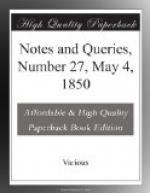“ELIZABETH, Heb. Peace of the Lord, or quiet rest of the Lord, the which England has found verified in the most honoured name of our late sovereign. Mantuan, playing with it maketh it Eliza-bella; and of Isabel he says ’The same with Elizabeth, if the Spaniards do not mistake, which always translate Elizabeth into Isabel, and the French into Isabeau.’” {440}
Howard, Earl of Surrey.—Dr. Percy is said, in Watt’s Bibliotheca Britannica, to have prepared an edition of the poems of the Earl of Surrey, the whole impression of which was consumed in the fire which took place in Mr. Nicholl’s premises in 1808. Can any of your readers say whether Dr. Percy had a copy of the sheets, and whether he had prefixed thereto any life of the Earl of Surrey? or did Sir Egerton Brydges ever print any account of Surrey amongst his numerous issues from the Lee or other presses?
G.
Bulls called William.—In looking into the notes in my Provincial Glossary, I find that bulls are in Somersetshire invariably called William. Is this peculiar to that county?
C.W.B.
Bawn.—Mutual.—In vol. iii. p. 506. of Hallam’s Constitutional History of England, there occurs the following passage in reference to the colonisation of Ulster in 1612, after Tyrone’s rebellion:
“Those who received 2000 acres were bound within four years to build a castle and bawn, or strong court-yard; the second class within two years to build a stone or brick house, with a bawn; the third class a bawn only.”
What was the bawn, which was equally indispensable to the grantee of 2000, 1500, or 1000 acres? Richardson variously describes the term as almost any kind of dwelling, or “an enclosure of walls to keep cattle from being stolen at night;” in fact, a court-yard. This, however, conveys a very unsatisfactory idea, unless I am justified in supposing that a court-yard was insisted upon, even when a house could not be built, as insuring a future residential settlement, and thereby warding off the evils of absenteeism.
At page 514. of the same volume, I read,—
“Wentworth had so balanced the protestant and recusant parties, employed so skilfully the resources of fair promises and intimidation, that he procured six subsidies to be granted before a prorogation, without any mutual concession from the crown.”
Will Dr. Kennedy, or any other strict verbal critic, sanction this use of the word “mutual?”
ALFRED GATTY.
April 6. 1850.
[It is obvious, from the following lines from Swift’s poem, The Grand Question debated whether Hamilton’s Bawn should be turned into a Barrack or Malt-house, 1729, that a Bawn was there used to signify a building, and not an inclosure:—
“This Hamilton’s
bawn, while it sticks in my hand,
I lose by the
house what I get by the land;
But how to dispose
of it to the best bidder,
For a barrack
or malt-house, we now must consider.”




